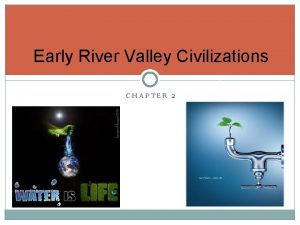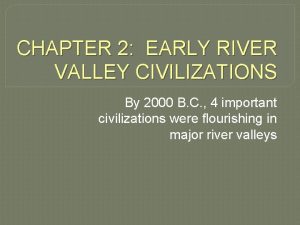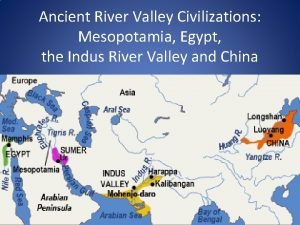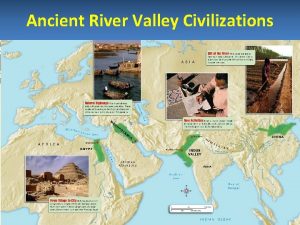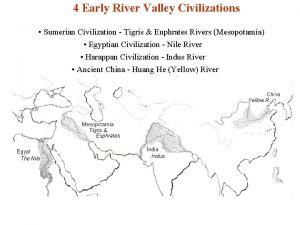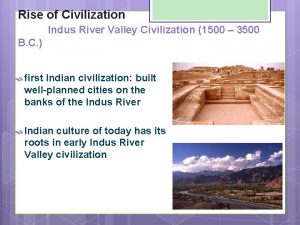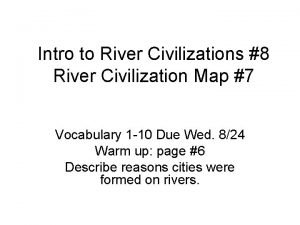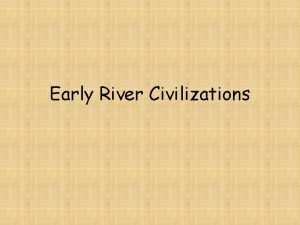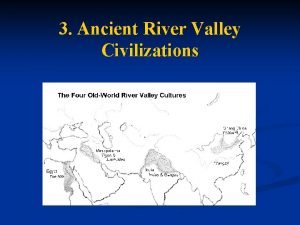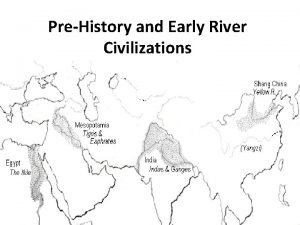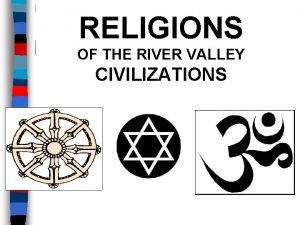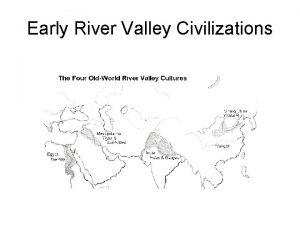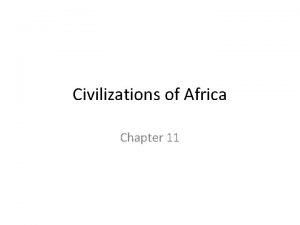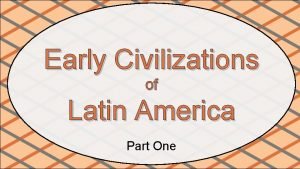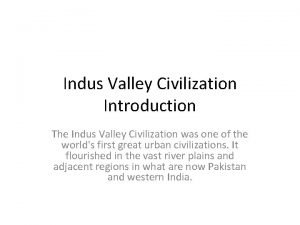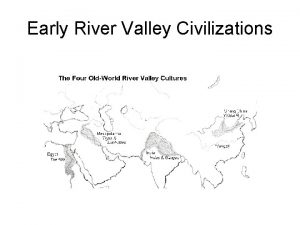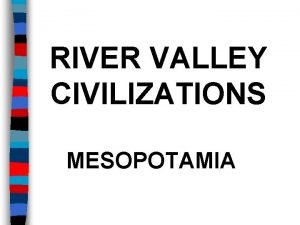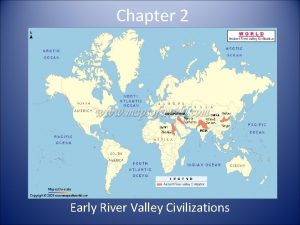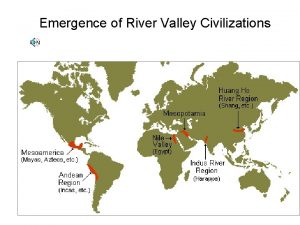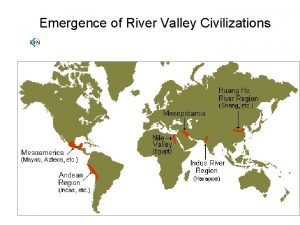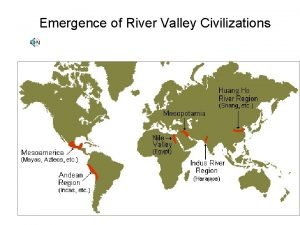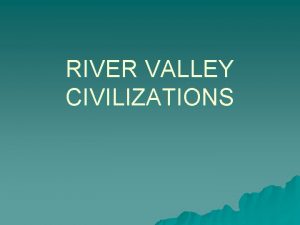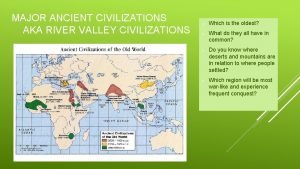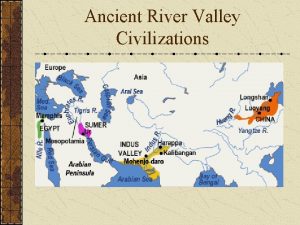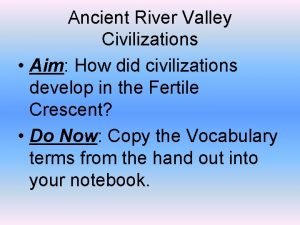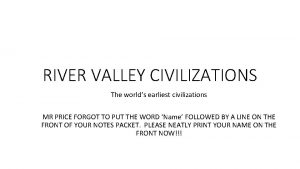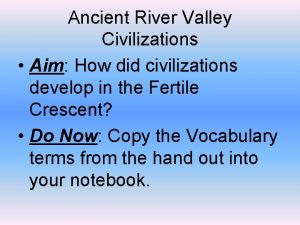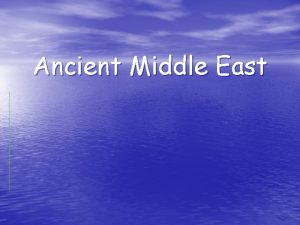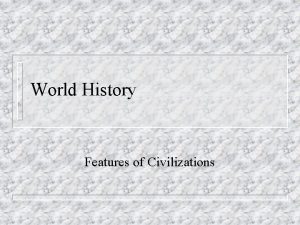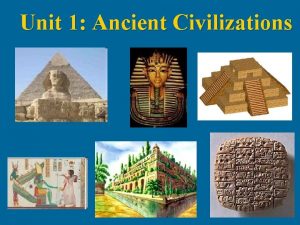Early River Valley Civilizations Early River Valley Civilizations




























- Slides: 28

Early River Valley Civilizations

Early River Valley Civilizations Mesopotamia There is an arc of land in Southwest Asia that is called the Fertile Crescent. Two of its rivers, the Tigris and Euphrates, flood in the spring. This flooding leaves rich mud, called silt, in the plain between the rivers. This is good for farming. Because of this, many thousands of years ago people settled in this area known as Mesopotamia (land between the rivers).

Mesopotamia

Mesopotamia The first civilizations began here. About 3300 B. C. , the Sumerians moved into the region. They developed the city of Ur. The Sumerians developed a writing system (cuneiform). Eventually, the villages grew into city-states.

Cuneiform

Mesopotamia Families became powerful and took control, creating a dynasty (a family of rulers). The government was usually a monarchy (government ruled by a King or Queen

Mesopotamia As civilization grew, society became divided into social classes. They believed in many gods (polytheism). They invented the sail, the wheel, and plow. Over time the Sumerians became weak and were conquered by other people

The Babylonians One of these groups was the Babylonians. They were led by a king named Hammurabi. He is famous for his code of laws – they were the first set of written laws. Hammurabi’s Code

Hammurabi’s Code It was very harsh, (an eye for an eye) people were punished severely for their wrong doing. However, it showed that the government had a responsibility to take care of the people. It is the oldest known legal system.

Egypt was more isolated than Mesopotamia. Natural boundaries: the desert, mountains, and the sea protected Egypt from being invaded over and over. Egyptian civilization grew up along the banks of the Nile River.


Egypt The Nile was more predictable, it flooded each year. About 3000 B. C. , Egypt was unified into one kingdom. The leader was the Pharaoh.



Egypt The Pharaoh was not only the king, but was seen as iving a god. This type of government was a theocracy.

Egypt Like the Sumerians, the Egyptians developed a writing system called hieroglyphics. The Egyptians were the first to devise a calendar that divided the year into 365 days.


Egypt The Egyptians were great builders; they built pyramids as tombs for their leaders. They used a process of mummification to preserve the body.





Other Early Civilizations Hittites Settled in Mesopotamia – invented iron weapons Persians They built a large empire in the Middle East. Their empire included Mesopotamia and Egypt. By maintaining their vast empire, the Persians stimulated cultural interchange throughout the Middle East.

Phoenicians They were traders, they developed an alphabet of 22 letters. The addition of other letters by the Greeks and Romans produced our alphabet. This made communication and record keeping easier.


Hebrews The Hebrews had a lasting effect on Western Civilization. Hebrew contributions to civilization were – monotheism – belief in one god, The Old Testament, ethical laws set down in the Ten Commandments, and high moral principles.

Hebrews The Hebrews are also known as the Jews. The Jews are considered to be God’s “chosen people”. Their religious book is called the Torah. Christianity and Islam both stem from Judaism.

 Chapter 2 early river valley civilizations
Chapter 2 early river valley civilizations River valley civilizations def
River valley civilizations def River valley civilizations vocabulary
River valley civilizations vocabulary River valley civilization map
River valley civilization map Ancient river valley civilizations powerpoint
Ancient river valley civilizations powerpoint River valley civilizations characteristics
River valley civilizations characteristics River valley civilizations map
River valley civilizations map Indus river valley timeline
Indus river valley timeline Map of river valley civilizations
Map of river valley civilizations Tigris euphrates and nile river
Tigris euphrates and nile river 4 river valley civilizations
4 river valley civilizations River valley civilizations map
River valley civilizations map Ancient river valleys map
Ancient river valleys map River valley civilizations religion
River valley civilizations religion Code of hammurabi
Code of hammurabi Ancient india lesson 1 early civilizations
Ancient india lesson 1 early civilizations Answer
Answer Chapter 11 section 1 early civilizations of africa
Chapter 11 section 1 early civilizations of africa Lesson quiz 14-2 pre-columbian america answers
Lesson quiz 14-2 pre-columbian america answers Early south american civilizations
Early south american civilizations Lesson 1 early civilizations
Lesson 1 early civilizations River valley primary school
River valley primary school Ohio valley river
Ohio valley river Ohio river valley 1763
Ohio river valley 1763 Fv pediatrics
Fv pediatrics Drowned river valley
Drowned river valley River valley community college
River valley community college Introduction to indus valley civilization
Introduction to indus valley civilization Hachure marks topographic map
Hachure marks topographic map
